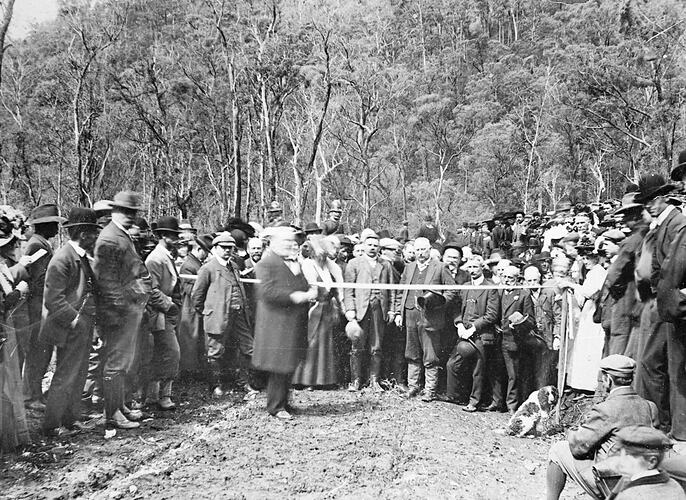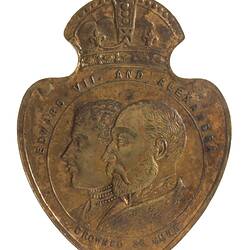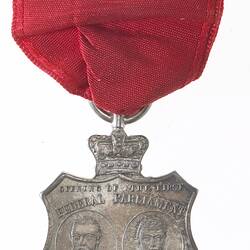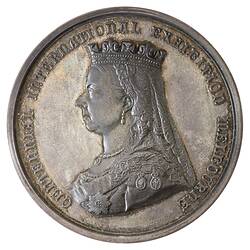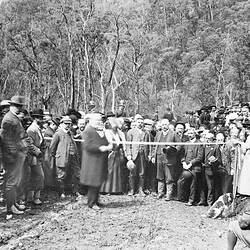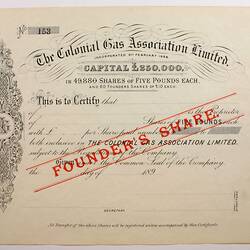Sir Thomas Bent, politician and land speculator, was born in Penrith, New South Wales, in 1838, son of an inn-keeper. His parents suffered financial difficulties and his father moved to Melbourne, working cartage contracts in Fitzroy. Bent finished his education there, and worked as a grocer's assistant. The family then moved to East Brighton, to a market garden on which all the sons worked. Bent's education ended at the age of 13. By 21 Bent had his own successful market garden, but gave it up to become a Brighton rate-collector. In 1863 he was elected to the Moorabbin Roads Board. Bent was a bully and from the outset he dominated other Board Members. In 1866 he was elected Chairman of the Board in circumstances that caused considerable controversy.
Bent's local contacts, including involvement in local sports, helped him in an astounding but narrow electoral victory for the Legislative Assembly seat of Brighton in 1871. It was not until 1874, after Bent had resigned as rate-collector and a new rate collector was appointed, that his manipulation of the electoral rolls became apparent. Rates amounting to nearly fifteen hundred pounds were outstanding - Bent had been able to orchestrate his electoral victory by manipulating records of people who had paid their rates, disallowing many votes. The issue was taken up with Brighton Council, but by then Bent was Mayor (again dubiously elected) and prevented an investigation.
Bent was a conservative who believed in progress, and believed that Victoria would become a paradise for both workingman and capitalist. He worked tirelessly on the Brighton and Moorabbin Councils, and became Mayor of the former and Chairman of the latter simultaneously 1884-5 and 1887-8.
Bent's land speculations began in 1873, just before he became Mayor of Brighton. He began by buying unsold parts of Dendy's Special Survey and slowly re-selling them. By the late 1880s he was speculating in land companies all over Melbourne. He worked hard to find public money to underwrite developments. The most notorious was his role as Commissioner of Railways in 1881-3, when the lines he developed directly increased the value of land he held along those lines. In 1890-92, when he was Chairman of the Railways Standing Committee, he was supposed to be pruning expenditure in the face of the depression, but instead strove to assist private liquidity through further public expenditure.
Bent became Speaker of the Legislative Assembly in 1892-94, but was defeated in the 1894 general election. He remained solvent during the depression through dairying at Port Fairy. He was re-elected to the sat of Brighton in 1900, and from February 1904 to January 1909 was Premier and Treasurer of Victoria. In 1907 he visited England, and in 1908 was knighted.
Bent married twice, the first time to Hannah Hall, who died childless, and the second time to Elizabeth Huntly, with whom he had two daughters.
Bent was also a strong supporter of the University of Melbourne and the Public Library and Museum. He was also a Trustee of the Royal Exhibition Building from 1892 - 1909 (see MM 105349 and MM 94164).
Bent died at Brighton on 17 September 1909. Although his health doubtless suffered from his considerable weight, his death may have partly been the result of a royal commission appointed by his successor to investigate corruption and irregularity in government land purchases. The commission established that Bent had not benefited financially from the purchases, but censured him strongly for unconstitutional behaviour and cast suspicion on the reasons for re-routing the newly built electric tramway from St Kilda to Brighton, directly past land that he owned.
References:
Australian Dictionary of Biography.
Kingston Historical web site http://localhistory.kingston.vic.gov.au/htm/article/74.htm.
More Information
-
Keywords
-
Localities
-
Authors
-
Article types
